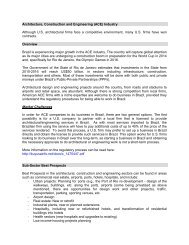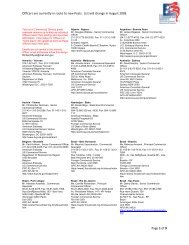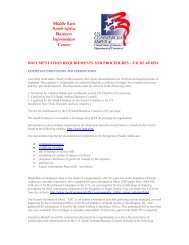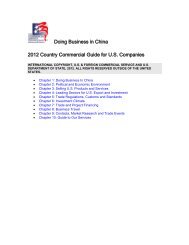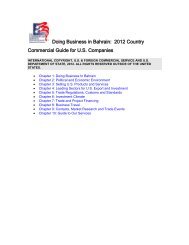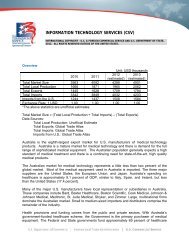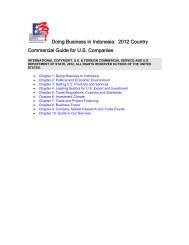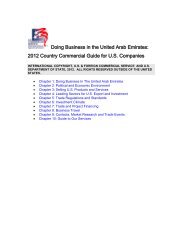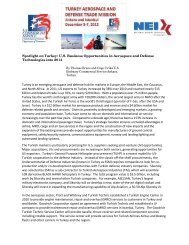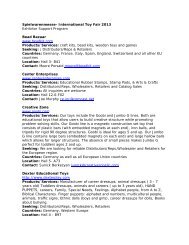Healthcare Technologies Resource Guide - Export.gov
Healthcare Technologies Resource Guide - Export.gov
Healthcare Technologies Resource Guide - Export.gov
You also want an ePaper? Increase the reach of your titles
YUMPU automatically turns print PDFs into web optimized ePapers that Google loves.
Egypt<br />
Summary<br />
The healthcare sector in Egypt, although large compared to its Middle East<br />
counterpart, has been relatively stagnant over the past few years. That being<br />
said, there should be a variety of investment opportunities as the Egyptian<br />
<strong>gov</strong>ernment is very keen on expanding the healthcare industry, especially<br />
relating to medical devices. In 2011, healthcare was responsible for 6.3% of GDP<br />
and total spending is expected to amount to $16.6 billion in 2012. Consumer<br />
healthcare grew by 12.6% in 2011 and spending is expected to reach $7.1 billion<br />
in 2012. The World Bank estimates that the average life expectancy for Egyptians<br />
has increased from 69 to 73 from the years 2000 to 2009. While the <strong>gov</strong>ernment<br />
has done much to mitigate disease in the country by way of supplying cleaner<br />
water and increasing immunization rates, hepatitis C still remains rampant as<br />
9.8% of the population is believed to be infected with it and it seems to grow<br />
at a fixed rate of 500,000 new cases a year. The Ministry of Health operates 1300<br />
hospitals which correspond to a supply of 60% of beds. Universities, the Army<br />
and the private sector constitute the other 40%. <strong>Healthcare</strong> expenditures by the<br />
<strong>gov</strong>ernment totaled $4 billion which is a 17% year-on-year increase.<br />
Market Entry<br />
U.S. medical equipment and products are traditionally well-received in Egypt<br />
due to their perceived high quality. Egyptian law requires that for public<br />
tenders, foreign companies must retain Egyptian commercial agents. However,<br />
most U.S. companies have found it beneficial to engage a local agent to handle<br />
the problems associated with communications, bureaucratic procedures, local<br />
business practices, and marketing.<br />
Based on geographical location or product basis, a firm can appoint multiple<br />
agents in Egypt to further enhance its success. Agent commissions would vary<br />
with services provided and the amount of individual contracts.<br />
Supplying reliable after sales service as well as spare parts and maintenance<br />
services is a key to maintaining a competitive advantage. Agents of medical<br />
equipment have found that keeping approximately 40% inventories of spare<br />
parts will satisfy the needs and demands of their clients. FDA approval is a key<br />
to having medical products registered and approved by the MOH in Egypt,<br />
although the MOH may still do additional testing on any medical device. The<br />
importation of used and refurbished medical equipment and supplies into<br />
Egypt is banned without prior approval of the MOH.<br />
Statistics<br />
Capital: Cairo<br />
Population: 82 million<br />
Currency: Egyptian Pound<br />
Language: Arabic<br />
U.S. Commercial Service <strong>Healthcare</strong> <strong>Technologies</strong> <strong>Resource</strong> <strong>Guide</strong> | 2012–2013<br />
Contact<br />
Rania Mekhail<br />
Commercial Specialist<br />
rania.mekhail@trade.<strong>gov</strong><br />
+202 2797-3487<br />
29





